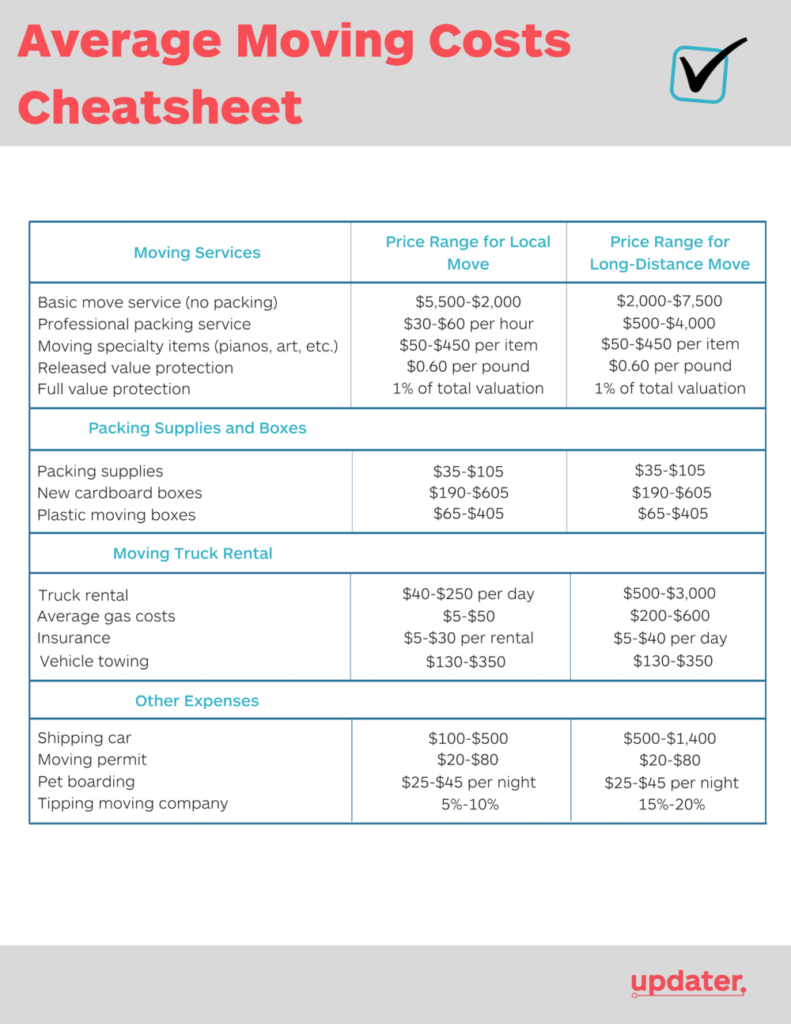How Much Does it Cost to Move? Calculating Your Moving Price

Moving soon? Get organized with our free moving checklist.
When you’re planning a moving budget, it helps to know how much it will cost to move. While this number depends on the size of your home, your moving company, and the distance you’re moving, there are some industry averages that will help guide your move. Costs like packing supplies, your moving date, and moving insurance will all impact the final price.
Follow this guide to learn about moving costs and estimate how much it will cost you to move to your new home. We’ve also thrown in a quick moving cost calculator that can help you determine a preliminary moving budget in just minutes!

On average, how much does it cost to move?
Local moves
The average cost for a local move ranges from about $350 for a one bedroom apartment to $1,500 for a four-bedroom home. Moving companies determine their prices for different home sizes based on the average weight of the household goods and the number of hours it takes to load and unloaded them.
Long-distance moves
Moving companies also take distance into account for long-distance moves. The average price for long-distance moves ranges from about $1,050 for a one bedroom apartment to $5,000 for a four-bedroom home.
For a breakdown of how much it costs to move, check out this moving cost guide organized by house size, hours of labor, and moving distance.
One bedroom
- Local: $200-$500
- 3-5 hours of labor
- Long-distance: $900-$1,200
- Average distance: 1,000 miles
Two bedrooms
- Local: $375-$750
- 5-6 hours of labor
- Long-distance: $2,000-$3,000
- Average distance: 1,000 miles
Three bedrooms
- Local: $800-$1,500
- 7-10 hours of labor
- Long-distance: $3,500-$5,000
- Average distance: 1,000 miles
Four bedrooms and up
- Local: $1,000-$2,000
- 10+ hours of labor
- Long-distance: $4,000-$6,000
- Average distance: 1,000 miles
Find the best moving price
With these estimates as a pricing guide, you’re ready to begin your search for a reputable moving company.
In order to provide an accurate quote and determine how much it will cost for you to move, the moving companies you choose may suggest a free in-home estimate. They may also offer an online estimate for smaller moves. We suggest getting at least three estimates in order to compare prices and find the moving company that works best for you. Here is a guide to help you prepare for your estimate.
In addition to your basic moving costs, there are other elements that will influence your moving budget. Consider these additional expenses that will affect how much it will cost you to move.
Dolly has a nationwide network of movers with flat-rate pricing for your apartment moves.

Moving date
Both the day of the week and the time of year are factors in how much it will cost you to move. Weekend moving dates and moves during the summer are more expensive because of the volume of people moving. Booking your moving date in advance, on weekdays, or during winter months can help secure a lower price.
Packing supplies
The price of common packing supplies like boxes, tape, plastic bins, and stretch wrap can add up when you’re preparing for your move. Ask your moving company about prices for packing supplies or plan to purchase them yourself. Here are some great places to find free moving boxes and save on your moving costs.
Professional packing
Many moving companies offer professional packing or crating services to help prepare fragile items before they go onto the moving truck. Crating involves building custom wooden boxes around fragile or irregularly shaped items to protect it during the move. These services are recommended for long-distance moves or moves that involve warehouse storage, but it can also be applicable to short-distance moves as well.
While packing services will increase how much it costs for you to move, they are invaluable to people who are moving at the last minute. Ask your moving company about their packing pricing or check out our packing guide if you decide to tackle the task yourself.
Specialty items
Preparing specialty items for your move may come with an additional moving cost. Items like pianos, pool tables, safes, and art may be flagged with an extra fee to protect them during the move. Your moving company may also offer crating, furniture disassembling, protective stretch wrap, felt pads, and mattress bags to protect your items. Here is a guide to packing fragile items yourself.
Just want to move a few bulky items? Check out Dolly!
Be aware, there are also some items moving companies won’t move. Appliances like refrigerators, ice machines, and washing machines may require additional care to disconnect or move. Other items a moving company won’t move include plants, alcohol, propane tanks, and household chemicals. Ask your moving company about their policy regarding these items.

Moving insurance
As a customer, you shouldn’t have to worry about your household goods getting damaged or broken during a move. Thankfully, moving companies offer a type of coverage called valuation to consumers. Valuation is sometimes called moving insurance, but it’s important to note that moving companies are not certified to sell actual insurance. Moving companies operate differently from insurance providers and as a result, are governed by different federal and state regulations.
However, for all intents and purposes, valuation functions just like moving insurance would. Valuation is designed to protect your household goods during your move by putting some or full liability on the moving company. Depending on the size and distance of your move, your valuation policy can add a few hundred dollars to your moving costs. To help you avoid unexpected expenses, here’s how to budget for this moving cost.
Check your homeowners insurance policy
Before you ask your moving company about valuation options, check to see if your current homeowners’ insurance policy includes moving insurance. This may save you an additional moving cost. Talk to your insurance agent about what protections your current policy offers and be aware of any coverage limitations. For example, many homeowners’ insurance policies only cover items while they are in transit but not while they are being moved into your new home.
If your homeowners’ insurance policy isn’t sufficient, moving companies offer the following valuation options.
Released-value protection
This basic valuation coverage is offered to customers at no additional charge and ensures your belongings at a certain dollar amount per pound. Under released value protection, the dollar amount is typically set by state or federal law and is around 60 cents per pound. That means if you have to file a claim, the moving company is only liable for 60 cents per pound per an item — whether that item is a dinner plate or a flat-screen TV.
If you feel comfortable with this amount of coverage and don’t want to put more liability on the moving company, then you can buy yourself a pizza and celebrate that released value protection comes at no extra charge to you.
Full-value protection
The more comprehensive valuation option is full-value protection. If an item is damaged during the move, this policy covers the full-replacement value of that item, whether that’s a payout according to the current market value of the item, a replacement with a similar item, or the cost to repair the item. Replacement procedures vary between moving companies, so ask what your moving company’s replacement policy is.
The price of full-value protection is calculated based on how much you choose to value your household goods at per pound. For example, if you value your goods at $6 per pound, and you have 10,000 pounds of household goods, then your whole shipment would be worth $60,000. Moving companies usually charge a 1% premium for full-value protection, so in this example, your premium would be $600.
If you have a prized furniture collection, a lot of expensive dishes, or anything else worth covering at full value, consider budgeting for this valuation option. Just be sure to get a quote from your moving company and ask about extra fees for covering unique, expensive items like $2,000 shoes.
Separate liability insurance
Some moving companies will offer to sell or accept additional liability insurance. These policies are purchased separately and their liability varies from state to state. With this insurance, the moving company is liable for the released-value protection policy mentioned above and your insurance policy is responsible for the rest. Check out available coverage options.

Tipping
Like many service industry jobs, tipping is not mandatory but it is appreciated by moving professionals and reflects a customer’s appreciation of a job well done. Expect to budget 5% to 10% of your total moving cost for smaller local moves and 15% to 20% for larger long-distance moves. The tip can then be distributed amongst your moving crew.
Your happiness with their level of service, the number of hours worked, and if the crew moved any particularly heavy items should factor into your decision. Here’s some more advice on how much to tip your moving crew.
Becoming an educated consumer, who knows what moving costs to expect, will help make your move easier and more affordable. Armed with this moving information, you have the tools to determine how much it will cost to move to your home. Happy moving day!
There’s a lot to remember, so if you need a reminder, download this cheatsheet. It has the average costs for each part of your move so you can budget easily.














